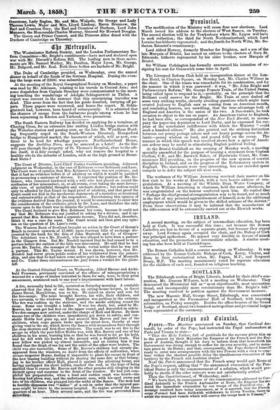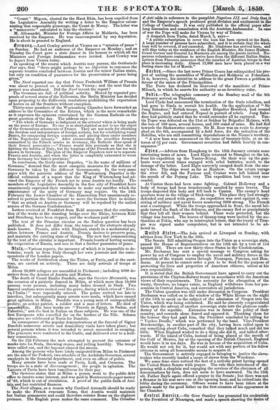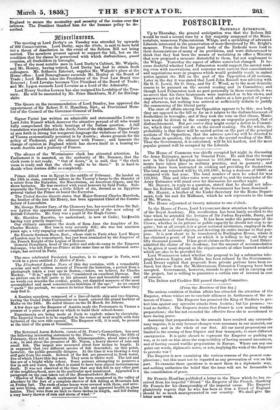,fortigu Rub Colonial.
cfratre.—The Moniteur announced on Sunday, that Cardinal An- tonelli, by order of the Pope, had instructed the Papal ambassadors at Paris and Vienna to state-
" That the Holy Father, full of gratitude for the succour given him up to the present by their Majesties the Emperor of the French and the Em- peror of Austria, thought it his duty to inform them that henceforth his Government was strong enough to suffice for its own security, and to main- tain peace in its States; and that, consequently, the Pope declared himself ready to enter into arrangements with the two Bowers with a view to com- bine within the shortest possible delay the simultaneous evacuation of his territory by the French and Austrian armies." Next the Paine announced that the French army would quit Rome at the Pope's request, adding that " the announced evacuation of the Pon- tifical States is only the commencement of a solution, which would pro- bably be sterile if the other interests were not satisfactorily settled." Then the Conslitutionnel, of Wednesday, said-
" We learnthat, in consequence of the communication addressed by Car -r dinal Antonelli to the French Ambassador at Rome, the Emperor baser- dered the immediate evacuation by our troops of the Pontifical city. A message received here today announces, as it is asserted, that the Frenoh corps (1 'arine'e had been forthwith withdrawn to Civita Vecchia, thereto await the transport vessels which will convey the troops baok to F'roiloo." " Count " Migeon, elected for the Haut Rhin, has been expelled from the Legislative Assembly for writing a letter to the Emperor calum- niating that respectable personage, the Count de Morny. The letter was a " manceuvre ' calculated to bias the electors'.
M. Allessandri, Minister for Foreign Affairs in Moldavia, has been received by the Emperor. He was unaccompanied by any deputation. He is about to proceed to England.
fumang.—Lord Cowley arrived at Vienna on a "mission of peace" on Sunday. He had an audience of the Emperor on Monday ; and on Tuesday the Court gave a state dinner in his honour to which all the Ministers and Foreign Ambassadors were invited. Lord Cowley was to depart from Vienna today.
• In speaking of the course which Austria may pursue, the Ostdeutsche Post says, that "there might perhaps be no objection to renounce the separate treaties concluded between Austria and the minor Italian states, but only on condition of guarantees for the preservation of peace being given." The Nord reported one day that Prince Frederick William of Prussia was about to proceed on a mission to Vienna ; and the next that the project was abandoned. Did the Nord invent the report ?
The Germans are full of political activity. Moved by repeated pro- posals of several states of the Zollverein' the Berlin Ministry has decided upon proposing to the Zollverein resresolutions prohibiting the exportation o horses on all the frontiers without exception. Thirty-nine members of the Wurtemberg Chamber have forwarded an address to the Committee of the Estates, which is the more remarkable as it expresses the opinions entertained by the German Radicals on the great question of the day. The address says :— • " The whole of Germany is indignant at the attentat which is being made on the peace of Europe. No one is so short-sighted as not to see the object of the tremendous armaments of France. They are not made for obtaining the freedom and independence of foreign nations, but for establishing vassal States, for conquering foreign countries, and placing them under members of the Napoleonic dynasty." After enumerating the atrocities formerly committed by the French armies in Germany, the Radicals thus speak of their former persecutor:—" France would fain persuade us that she is fighting the battles of Italy, but the longings of the French are but too well known in Germany. The plan of the Emperor Napoleon now is to separate Prussia and Austria, and when the latter is completely exhausted to wrest from Germany her fairest provinces." In conclusion, the thirty-nine Deputies, "in the name of millions of Germans," demand that the most energetic measures for the defence of Germany be taken by the different Governments. In the very same paper with the patriotic address of the Wurtemberg Deputies is the official refutation of a report that the King of Wurtemberg had ad- vised the Emperor of the French not to press Austria too hardly. The members of the Legislative Assembly in the free city of Frankfort have unanimously expressed their readiness to make any sacrifice which the maintenance of the unity of Germany may require. On the 24th February the Lower Chamber of the Hanoverian Diet unanimously re- solved to petition the Government to move the German Diet to declare " that an attack on Austria or Germany will be repulsed by the united armies of the German Confederation."
Letters received at Frankfort from Kehl announce that the continua- tion of the works at the standing bridge over the Rhine, between Kehl and Strasburg, have been stopped, and the workmen paid off."
The text of the Prussian circular on the Italian question has been published. It does not differ from the tenour of the abstracts already made known. Prussia, alike with England, stands in a mediatorial po- sition between France and Austria. Prussia desires to preserve peace and maintain the existing state of things. The new fact communicated by the text of the circular is important. Prussia boasts of having secured the cooperation of Russia, and sees in that a further guarantee of peace.
S li.—VeHous reports, the accuracy of which it is impossible to de- termine, reach us from Italy through her own journals and the corre- spondents of the London papers. The works of fortification along the Ticino, at Pavia, and at the envi- rons, are carried on actively. There are daily arrivals of troops at an.
About 20,000 refugees are assembled in Piedmont ; including 4000 de- serters from the Armies of Austria and Modena.
The death of Count Emilio Dandolo, says the Carriers Mercantile, was the occasion of a patriotic funeral in Milan, at which more than 10,000 persons were present, including many ladies dressed in black. Two funeral orations were recited over the grave, during which cries of "Evvi- va Phalle ! " were repeatedly uttered. The police arrived too late to interfere, but subsequently many arrests were made, which have caused great agitation in Milan. Dandolo was a young man of unimpeachable probity, an ardent patriot, a soldier and a man of letters. He died of lieirasidbitoi. His later works are " Travels in Egypt, in Sudan, and Palestine," and the best in Italian on those subjects. He was one of the first Europeans who v-avelled far on the borders of the Nile. Solemn obsequies are celebrated at Turin for Dandolo.
In consequence of the popular demonstrations at the funeral of Signor Dandolo numerous arrests and domiciliary visits have taken place; but several persons whom it was intended to arrest succeeded in escaping. The prisoners were conducted to the Castle, and delivered over to a mili- tary commission. On the 23d February the mob attempted to prevent the entrance of masks into La Scala, throwing stones, and yelling horribly. The troops were called out, and the bayonet cleared the streets. Among the persons who have lately emigrated from Milan to Piedmont are the son of the Podesta, two attaches of the Archduke Governor, several employes in the financial department, and even an officer of police. Many arrests have been made at Pavia, Lodi, and Cremona. The troops are in a state of discouragement ; the people in agitation. The Lancers of Pavia have been tumultuous for their pay. The Opinions states that at Milan a person went to the public debt office to receive some interest, and was paid in Monteccueolo paper money of '49, which is out of circulation. A proof of the public faith of Aus- tria and her restricted finances.
The Nord alleges, as a reason why Cardinal Antonelli should be ready to make the French evacuate Rome, that Austria would maintain her Italian armaments and could therefore reenter Rome on the slightest pretence. The English press makes the same comment. The Oittadino
d'..etati adds in reference to the pamphlet Napoleon III. and Italy that it and the Eniperor's speech produced great division and excitement in the College of Cardinals. It was only published in the official paper after long discussion and consultation with the Austrian Ambassador. In case of war the Pope will make for Vienna by way of Trieste.
A despatch from Turin, dated March 3, says— "A public subscription to cover the loan has been opened at the Bank. A large number of persons have subscribed, and it is certain that the whole loan will be covered, if not exceeded. Mr. Gladstone has arrived here, and will dine today at the residence of the English Minister, Sir James Hudson. Count Cavour and General La Marmora are among the guests invited. Nu- merous volunteers continue to arrive hem from the different Italian States. Letters from Piacenza announce that the number of Austrian troops in that place is increasing daily. Almost 12,000 men have been placed on a war footing since the 1st of March."
Surittc—Since the last news Prince Couza has relinquished his pro- ject of uniting the assemblies of Wallachia and Moldavia at Folrachani. It is, however, his intention to address to the great Powers a petition in favour of the union of the Principalities.
The Porte has declared its disavowal of the manifesto of Prince Milosch, in which he asserts his authority as an hereditary ruler.
SUM/I.—The telegraphic summary of the Bombay mail of the 9th February arrived on Thursday. Lord Clyde had announced the termination of the Oude rebellion, and had gone to Simla to recruit his health. On the application of " Sir Jung Bahadoor," British troops, under Brigadier Hereford, had crossed the Raptee, and had entered Nepaul in pursuit of rebels. Jung Baha- door had publicly stated that he would surrender all he captured. Tat- tle Topee was defeated on the 21st at Sekkur by Brigadier Holmes, with the loss of 100 men, several horses, and 600 stand of arms. He had fled towards the Shekawattee country. Sir H. Rose was en route to Aurung- abed on the 6th, accompanied by a field force, for the reduction of the Rohillaa, who are still committing depredations in the Nizam's territory.
" A new loan was announced on the issue of treasury-bills, at an in- terest of st per cent. Government securities had fallen heavily in con- sequence."
fL jtu a .—Advices from Hongkong to the lath January contain some interesting items of news. Lord Elgin returned to Shanghai on the 1st, from his expedition up the Yantse-Kiang. On their way up the gun- boats were several times engaged with rebel batteries, much to the damage of the latter. Lord Elgin narrowly escaped death from the ene- my's fire. The ships went as far as Hankow. On the return voyage the river fell, and the Furious mull Cruiser were left behind near the mouth of the Poyang Lake. The expedition had been very suc- cessful.
At Canton there had been some fighting. Colonel Holloway and a body of troops had been treacherously assailed by some braves. The troops dispersed this body and fell back to Canton. The enemy's head quarters were in the village of Shek-tsing. This place they had strongly defended and armed with guns. An expedition was sent against it, con- sisting of military and naval forces mustering 2000 strong. The French sent a contingent. While the troops approached in front, the naval bri- gade turned the flank of the defences, and the enemy fled so precipitately that they left all their women behind. These were protected, but the village was burned. The braves of Quang-tung were incited by the au- thorities at Pekin, who say in intercepted letters, that the treaty of Tien- sin was signed under compulsion, but is not intended to be ad- hered to. • RUM! htaiff.—The Asia arrived at Liverpool on Sunday, with advises from New York to the 16th.
The Senate Bill admitting Oregon into the Union as a sovereign state, passed the House of Representatives on the 12th ult. by a vote of 114 against 103. There are now thirty-three States in the Confederation. Mr. Buchanan has sent a special message to Congress asking for power by act of Congress to'employ the naval and military forces in the protection of the transit routes through Nicaragua, Panama, and Hon- duras. At present he cannot order a gun to be fired for the purpose of protecting the lives and properties of American citizens, unless at his own responsibility. It is stated that the British Government have agreed to-carry out the provisions of the Clayton-Bulwer treaty in accordance with the American views of their requirements. The necessity for the abrogation of the treaty, therefore, no longer exists, as England withdraws from her pos- sessions in Central America, and surrenders all jurisdiction.
The Cuban question was still under discussion in Congress. President Buchanan was called on to the window of the White House on the night of the 13th to speak on the subject of the admission of Oregon into the Union, which was being celebrated. He said he sincerely congratulated them upon the advent of another sovereign state into the glorious confe- deracy of the republic. Extension was in future the policy of their country, and cowards alone feared and opposed it. Thanking them for the honour they had paid him, the President concluded by calling for "Yankee Doodle," which was performed by the band. Vice-President Breckenridge, in another part of the city, having been called upon to say something about Cuba, remarked that they talked much and did too little. When England wished to do a thing she did it, and talked after- wards. If the island of Cuba, instead of being placed at the mouth of the Gulf of Mexico, lay at the opening of the British Channel, England would have it in ten days. He was in favour of the acquisition of Cuba. He would not rob for it, but would act with any portion of his fellow citizens in using all honourable means to acquire it.
The Government is actively engaged in bringing to justice the slave- traders who recently landed a cargo of slaves from the Wanderer.
We some time since noticed the fact of a catholic priest having opened the United States Senate with prayer. The rule then introduced of dis- pensing with a chaplain and engaging the services of the clerymen of all denominations by turn, does not seem to have answered. 04 the 15th ult. Father Bayle again offered a prayer in the Senate ; but there was not a Senator in his seat save one at the opening hour, and he retired into the lobby during the ceremony. Offence seems to have been taken at the parade made by the good father on the first occasion of his appearance in the Chamber.
Central Itarrir H.—Sir Gore Ouseley has presented his credentials to the President of Nicaragua, and made a speech showing the desire of
England to secure the neutrality and .security of the routes over the isthmus. The President thanked him for the humane policy he de- scribed.




























 Previous page
Previous page